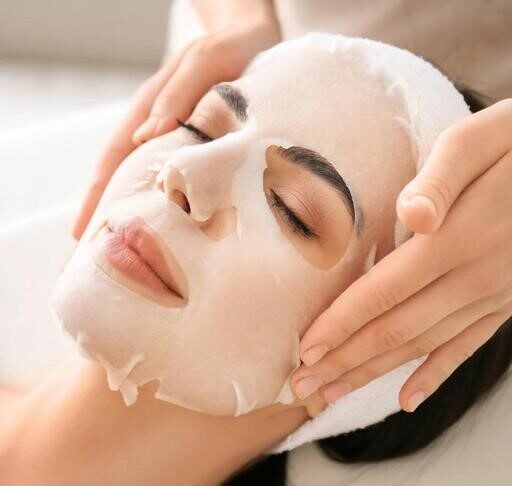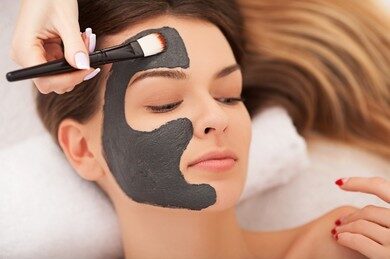A skin mask, often referred to as a facial mask, is a topical skincare item meant to be applied to the face for a brief duration, typically between 10 to 20 minutes, before being removed or rinsed away. Unlike everyday cleansers or moisturisers, masks serve as intensive treatments that provide a concentrated dose of ingredients aimed at tackling specific skin issues.
In the realm of skincare, one product truly shines for its immediate effects and the luxurious feel it provides at home: the skin mask. Whether you’re dealing with breakouts, lacklustre skin, or dryness, a quality mask can make a significant difference. Let’s explore the wonders of the mask, its types and does a facial mask expires.
Types of Skin Masks
When it comes to skin masks, there’s no universal solution. Based on your skin type and desired outcomes, here are some well-known options:
Clay Masks
These are Perfect for those with oily or acne-prone skin. Clay works to absorb excess oil, clear out pores, and eliminate impurities.
Sheet Masks
These masks are infused with serums and are excellent for hydration and brightening. Apply the sheet to your face, unwind, and let it do its magic.
Gel Masks
Ideal for dry, sensitive, or fatigued skin. They provide a calming, cooling sensation while delivering deep moisture.
Cream Masks
Luxurious and nourishing, cream masks are perfect for mature or dry skin. They offer intense hydration and help plump the skin.
Charcoal Masks
Renowned for their detoxifying properties. They help eliminate blackheads, minimise shine, and cleanse the pores.
Exfoliating Masks
These masks feature enzymes or acids (such as AHA/BHA) that help remove dead skin cells, unveiling a smoother and more radiant complexion.
Expiration of the Facial Mask
Indeed, facial skin masks have an expiration date, similar to other skincare items and applying an expired mask could pose a risk to your skin. Facial masks are made with active components such as vitamins, acids, clays, essential oils, or plant extracts. As time passes, these ingredients may diminish in potency, degrade, or get contaminated with bacteria or mould, particularly if the product isn’t stored correctly.
How to Prolong the Expiration of the Facial Mask?
To Store in a Cool Place
Keeping facial masks in a cool, dry location is crucial for ensuring their safety, effectiveness, and longevity. Warm and humid environments, such as bathrooms, can foster the growth of bacteria and mould, particularly in masks with natural or water-based components. High temperatures and exposure to direct sunlight can also break down active ingredients such as vitamin C, hyaluronic acid, and essential oils, diminishing the mask’s effectiveness, which leads towards the expiration of the facial mask
Furthermore, heat can change the texture of masks, leading them to dry out, separate, or become clumpy, making them less enjoyable and effective to use. Proper storage of masks also safeguards the packaging from warping or leaking.
To maintain the quality of your facial mask, it’s advisable to store it in a drawer, cabinet, or refrigerator, away from direct heat, light, and moisture. This not only prolongs the product’s life but also ensures that your skin benefits fully from its ingredients.
Use of a Spatula
It’s essential to use clean hands or a spatula when applying a facial mask to ensure hygiene and avoid contamination. If you dip unwashed fingers into the mask jar, you risk introducing bacteria, oils, and dirt from your skin into the product, which can lead to microbial growth, spoilage, and skin irritation over time.
This is particularly important for masks that contain natural or preservative-free ingredients, as they are more susceptible to contamination. By using a clean spatula or brush, you not only keep the product safe and effective for a longer period but also achieve a more even and mess-free application. Adopting this simple practice helps safeguard both your skin and the quality of the mask.
To Tightly Seal of Mask
Tightly sealing your facial mask after each use is essential for maintaining its freshness, potency, and safety. If a mask is left open or not sealed correctly, air, moisture, and bacteria can infiltrate the container, resulting in contamination and quicker degradation of the ingredients.
Exposure to air can lead to oxidation, diminishing the effectiveness of active components such as antioxidants, vitamins, and natural extracts. Moreover, moisture from the surroundings can change the texture and consistency of the product, making it less enjoyable and possibly unsafe to use. By properly closing the lid after each use, you not only prolong the mask’s shelf life but also ensure that every application stays clean, effective, and beneficial for your skin.
Avoiding Water Contamination
Preventing water contamination in facial masks is crucial for preserving their purity, effectiveness, and safety. Adding water, especially unfiltered tap water, to the mask container can promote bacterial or fungal growth, as water creates a damp environment where microbes flourish. This poses a significant risk for natural or preservative-free masks, which do not contain strong antimicrobial agents to inhibit spoilage.
Even minimal amounts of water can change the formula’s consistency, cause ingredient separation, and shorten the product’s shelf life, which ultimately expires the facial mask. To avoid contamination, it’s advisable not to add water directly into the container; instead, transfer the required amount into a separate bowl for mixing if needed. This straightforward step helps maintain the mask’s quality and ensures it stays safe and effective for your skin.
Contamination Prevention
Keeping the packaging of a facial mask intact is crucial for safeguarding the product against contamination, spoilage, and diminished effectiveness. The packaging acts as a shield against outside factors like air, light, moisture, and bacteria, all of which can deteriorate the mask’s quality over time.
If the container is damaged, cracked, or not sealed correctly, it can permit these harmful elements to infiltrate, resulting in alterations in texture, decreased potency of active ingredients, and a heightened risk of microbial growth. Damaged packaging can also lead to leaks or the product drying out, making it less effective and possibly unsafe to use. Ensuring that the container stays whole and is stored correctly helps maintain the mask’s stability, prolongs its shelf life, and ensures a safe and effective application every time.
Conclusion
In summary, facial masks serve an important function in skincare by providing specific ingredients that assist in cleansing, hydrating, and nourishing the skin. When applied appropriately and regularly, they can improve skin texture, diminish blemishes, and encourage a healthy, glowing complexion. Integrating facial masks into a consistent skincare regimen, coupled with adequate hygiene and storage methods, guarantees optimal effectiveness and sustained skin health.

 Medically reviewed by
Medically reviewed by 
